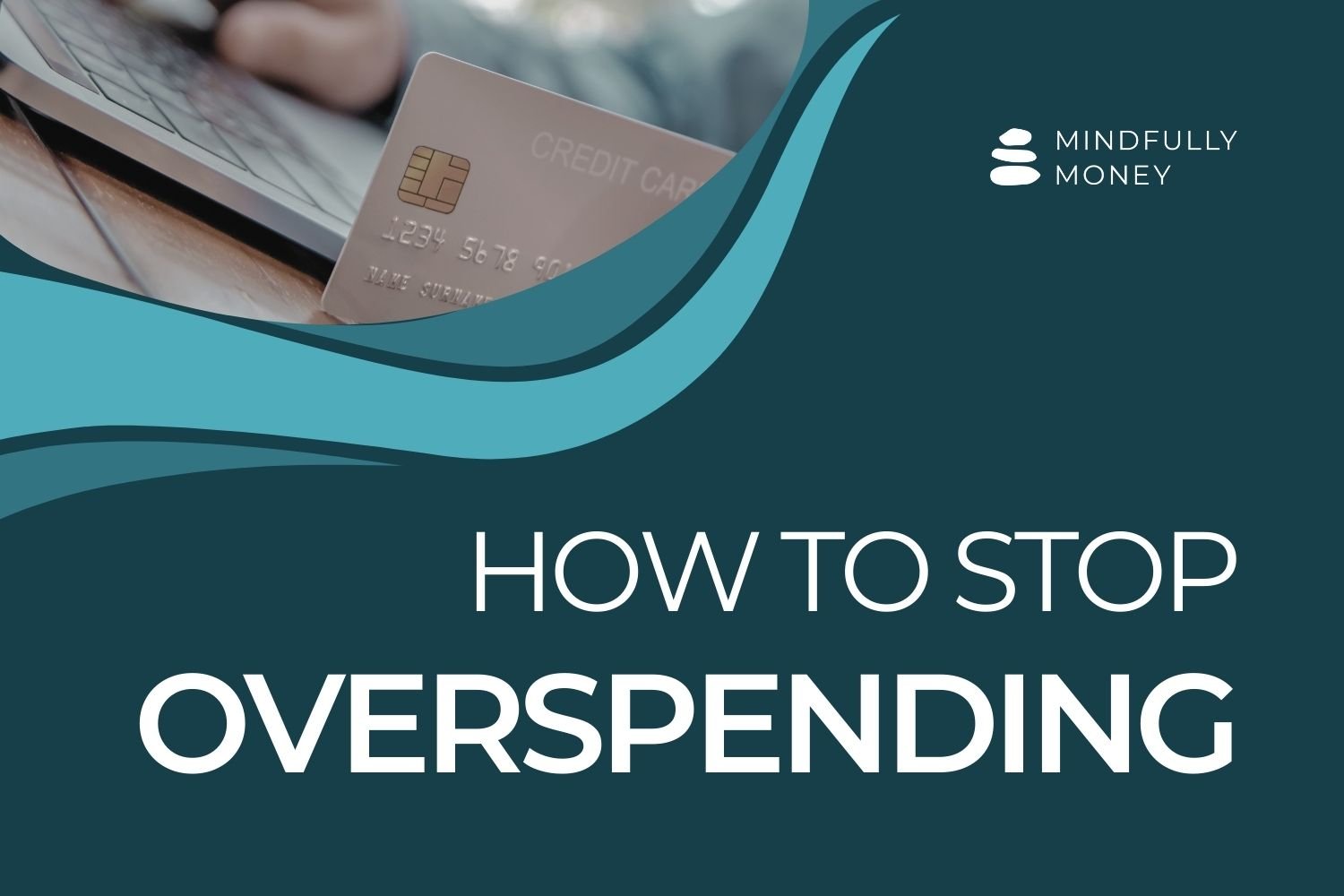What’s Holding You Back from Taking Control of Your Money?
Managing money is actually quite simple. You spend less than you earn, make sure your bills are paid on time, keep extra money around to cover you when “stuff” happens, and save for the future and anything else you want.
Pin this image for later!
But “simple” is not the same as “easy.”
Even though the basic rules of money management are straightforward, putting them into practice can be much more of a challenge. Why?
Because managing your money involves emotions, habits, and mindset. We think managing money is about numbers and math, but in reality, it’s about what’s going on in your head.
That’s why you may know that you need to make a change with your finances, and you may even want to, but you’re still not doing it.
Here are a few things that might be going on in your brain that are holding you back from taking action with your money:
1. You’re afraid of the negative emotions and uncomfortable feelings that you will likely feel when going through the process of change.
Taking action to change something in your life usually forces you to face the fact that you’ve made some mistakes in the past, or that you haven’t done as well as you think you should have.
For example, If you’re in debt, you might be feeling shame because society has taught us that debt is shameful.
If you’re getting closer to retirement and you haven’t started saving yet, you might be feeling regret or think that you’re a failure for not having started sooner.
When we are afraid of taking action, the reason is often not fear of the action itself (such as getting out of debt). Rather the fear is of the negative feelings—we’re afraid of having to feel bad.
The reality is that bad and uncomfortable feelings are simply part of making changes in your life. If change was easy, you’d have already done it. The only way to grow, evolve, and change your life is to embrace those feelings as a sign that you are doing something different and better. So don’t let them hold you back from taking charge of your finances.
2. You think that money is hard.
This thought is extremely common, but it is also a self-fulfilling prophecy. If you think that it is hard, you will let it be hard and never take action.
For example, let’s say that you have no idea where your money is going and/or you ran out of money before the end of the month, so you decide you need a budget. Maybe you even downloaded YNAB—the You Need a Budget app. You spent some time linking your accounts and assigning jobs to your money, but then life happened and derailed your plans. So you failed once and gave up entirely because it was too hard.
Was it actually too hard?
From everything I’ve heard, YNAB has a steep learning curve. But once people learn it, they become devoted users and recommend it to everyone they know.
Certainly, budgeting is challenging. But not doing something because it is “too hard” is a cop-out. You just haven’t figured out how yet. Maybe you haven’t learned how to use the system yet. Maybe you’re not using the right system for you yet.
Not having it all figured out yet is very different from something being too hard.
So if you are avoiding things or giving up because something is too hard, I encourage you to let go of that language and start thinking positively about what steps you could take to figure it out. Because everything can be figured out over time with the right tools, information, help, and resources.
3. It’s too overwhelming and you don’t even know where to start.
Trying new things can often feel overwhelming because you don’t yet have enough information to make a specific plan. It can feel like you’re in this big cloud, grasping for something tangible, but nothing tangible is there.
Anyone who has experienced overwhelm in any area of life knows that it is a very real thing and can be difficult to manage.* The easiest thing is often to just try to ignore that big storm cloud looming over you, but we all know that that doesn’t typically end well.
If you are dealing with overwhelm when it comes to money, it can help to take baby steps. You don’t have to learn everything today and it is unrealistic to think that you’re going to make massive change all at once.
Start with the smallest possible step. That might be something like logging into your bank accounts, taking stock of your situation, figuring out what your numbers are, or learning about different types of retirement accounts. There’s always a first step, and breaking it down can seem more manageable.
If you need help, consider hiring a financial coach who can walk you through all of the steps and help you figure out what to do and when to do it.
4. You think that the problem is out of your control.
I frequently hear people say things like:
“I’d be better off if it weren’t for inflation.”
“I’d be able to own a home if the prices weren’t so crazy.”
“The system is rigged and I’ll never be able to get ahead.”
“How can I save for retirement when I’ve already lived through two recessions, got laid off, and can barely get by?”
“I was doing fine until we got hit with gigantic medical bills we can’t pay.”
“I was always told I should go to the best school I can get into and that it would be worth whatever the cost was, and now I’m buried in student loan debt.”
It is true that things like the economy, laws and regulations, medical conditions, racism, sexism, etc have a very real effect on our financial situations.
AND, it is also true that most of us have more control than we like to think.
Maybe you can’t control inflation, but you can choose to be more intentional with your money and find ways to spend less.
You can’t do anything about the expensive medical procedure, but you can still make the best of it and do your best to pay it off over time.
You can’t go back and make a different decision about student loans, but you can choose to be thankful for what you learned and make a plan to pay it back.
It’s natural to feel emotional distress, fear, anger, hopelessness, etc in these situations, but you still have to take care of yourself and choose to move forward.* Taking small steps and making a plan can make you feel much more in control of your circumstances.
5. You’re too comfortable in your present circumstances.
Human beings are wired to maintain the status quo. This is in part because we don’t want to risk pain and loss because that might threaten our survival.
For example, someone who wants to leave their job and start a new business will have a very hard time making the leap because they are afraid that things might not work out. It is easier to stay in a job you hate, because the situation and consequences are known. It feels better to stick with a crappy job you know than to take the risk of ending up somewhere worse.
Because our brains are working in this way, we often default to doing nothing at all even if we’re not thinking about negative consequences.
This often shows up as thinking “I’ll deal with it later” or “it’s not that big of a deal.” We minimize and rationalize our current situation in order to feel better about not changing it. Our brains are very powerful in this way.
You can combat this by raising your awareness of the pain of NOT taking action (or of continuing a negative action).
For example, let’s say you want to start saving for retirement and you need to find money in your budget to put in your retirement account. Your brain is likely focused only on the pain you feel in the present of having to give up other things in order to save more. You don’t want to experience that, so you tell yourself you’ll do it later and you don’t start saving.
But what if, instead, you brought awareness to the longer term pain that you’ll feel later when you don’t have enough to live on in retirement? What if you start imagining your retired self living in a dingy apartment and not being able to do any of the things you would like to do?
By raising the level of pain you feel when you think about the consequence of not taking action, you can increase your motivation for change.
How to Take Action
So if you want to take action with your money, but you’re holding yourself back, here’s what you need to do:
Identify why. What thoughts and feelings are you experiencing that are causing you to avoid taking action?
Give yourself compassion. Forgive yourself for making mistakes. Tell yourself that you were doing the best you could with what you had. Remind yourself that you can start fresh and move on.
Make a plan and start with baby steps. Small steps over time can lead to massive change over time.
Get help if you need it. A financial coach can help you identify and overcome obstacles and walk you through the steps to meet your goals.
Use this post as motivation to start right now, today, with one thing.
*Many of these feelings can be related to anxiety, depression, and other mental health challenges. If these feelings are persistent, part of a larger issue, or causing significant challenges in your everyday life, I encourage you to get help from a mental health practitioner. There is zero shame in getting help with mental health.




